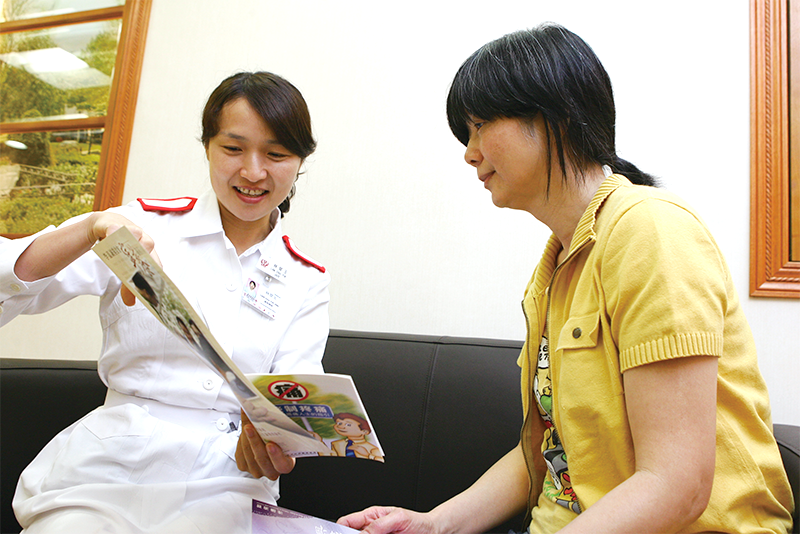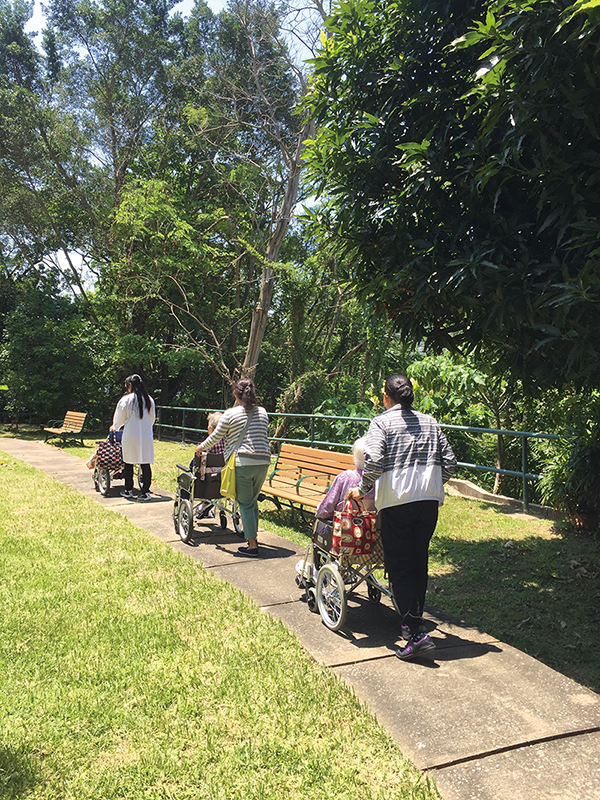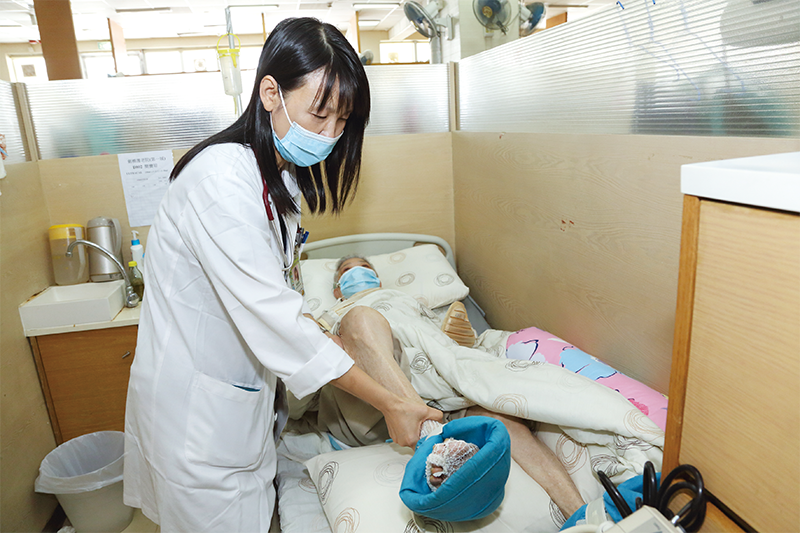
The period at the end of life is different for each person, but how can patients live life to the fullest? Healthcare teams work to make life better for patients and their families.
Parallel treatment on chemotherapy and palliative care
Name: Sze-wah (pseudonym) (27 years old)
Diagnosis: Confirmed stage 4 cancer at Pamela Youde Nethersole Eastern Hospital
Course of treatment: Through palliative care in addition to chemotherapy, oncologist helped Sze-wah manage symptoms. When further chemotherapy did not work for Sze-wah, a palliative care nurse was engaged to support her and her family. The palliative care nurse visited Sze-wah at home regularly to follow-up her condition and usage of medications, educated her family about home care, as well as referred Sze-wah to receive massage service provided by community partners to relieve pain. Sze-wah’s physical condition worsened and was later admitted to palliative care ward. She was determined to die at that time. Encouraged by the oncologist and medical social worker who visited her frequently, Sze-wah and her family expressed their love and thoughts to each other and were reconciled. Shortly, Sze-wah passed away in peace. The medical social worker also provided bereavement care and support to Sze-wah’s family. One day, the oncologist received a call from Sze-wah’s mother. She said that she felt at ease that her daughter passed away in peace. Sze-wah’s mother also said that with timely intervention of palliative care service, Sze-wah felt being accepted, cared and supported during her last journey, and died with no regret.
Safeguarding patient’s will with concerted effort
Name: Mrs Leung (80 years old)
Diagnosis: End-stage renal failure, receiving treatment at Caritas Medical Centre
Course of treatment: With multiple complicated diseases, Mrs Leung made up her mind to opt for palliative care instead of dialysis. She also wished to refuse life-sustaining treatment in end-stage of condition. Her daughter respected her mother’s wish after discussion. Throughout a two-year shared care by renal team and palliative care team, Mrs Leung managed the symptoms brought by renal failure well. Mrs Leung’s condition deteriorated and was admitted to an acute ward. Witnessing her beloved mother becoming unconscious, the daughter proposed resuming dialysis for Mrs Leung. Palliative care team met the daughter, recalled the reason why Mrs Leung opted out dialysis, alleviated the daughter’s distress and supported her to provide her mother psychological and spiritual comfort. At last, the daughter believed that the best she could do for her mother was to respect her wish and accompany her in the last journey.
Meeting patient’s needs by inter-hospital transfer
Name: Man (pseudonym) (40 years old)
Diagnosis: Confirmed end-stage lung cancer, transferred from Queen Mary Hospital to Grantham Hospital to receive palliative care
Course of treatment: With the spread of cancer from lung to pelvis, Man suffered severe pain and was bedbound for a long period of time at Grantham Hospital. Worried about her son’s condition, Man’s mother did not attend follow-up consultation for her mood disorder problem. Her condition got worse and she said, “I will lose the meaning of life if my son passes away.” Medical social worker and clinical psychologist provided psychosocial and emotional support to the mother promptly and motivated her by telling her the son’s wish – his mother to stay healthy and cherish life. A few weeks later, Man successfully moved from bed to wheelchair by himself and was approved home leave to accompany his mother to attend follow-up consultation.
Later on, Man’s condition worsened and he was re-admitted to palliative care ward at Grantham Hospital. Taking into consideration of the mother’s psychosocial and emotional problem, Man was transferred to Hong Kong Buddhist Hospital to facilitate her mother, who lives in Wong Tai Sin, to pay visits to Man under these special circumstances. Soon after the transfer, he passed away with family members at bedside.
Heartfelt support for resident in RCHE
Name: Mrs Cheung (pseudonym) (93 years old)
Diagnosis: Confirmed end-stage heart failure, living in residential care home for the elderly (RCHE)
Course of treatment: Living in a RCHE, Mrs Cheung was assessed and invited to join the end-of-life care supported by the CGAT in 2015. One day, when the CGAT was providing clinical care for Mrs Cheung, they found that her youngest daughter (major caregiver) was emotionally unstable. After communication, it was noted that apart from taking care of her mother, the daughter was under great pressure from hiding the news about her sister’s death, and argument with her brothers, etc. The CGAT then sought support from the PC team. With concerted efforts, the CGAT focused on providing clinical care for Mrs Cheung and initiated advance care planning, while the PC team provided psychological support to Cheung’s daughter by referring her to medical social worker and clinical psychologist for follow-up. Timely support from two teams alleviated the suffering of Mrs Cheung and her daughter physically and psychologically.
● “I have the right to choose.”
COVER STORY
● Support the teams that care for lives
● Paediatric palliative care to debut at new children’s hospital
● A visit to palliative care ward
● Characteristics of palliative care ward
FEATURE
● Green doctor turns waste into treasure
● Growing ‘pot-friendly’ fruits and vegetables
WHAT'S NEW
● Outstanding hospital projects won 5 HMA awards
HELEN HA
● HA staff survey calls for more communication and appreciation
● Web browsing made easy with improved accessibility
APP EXPRESS
● DM Care empowers diabetes patients
STAFF CORNER
● Patients express high confidence in Accident and Emergency service
● Pragmatic leaders are ready for new challenges
● Positive energy fills Psychological Care Carnival
● Teens explored unique summer hospital experience
● Empathy and patience reduce complaints



